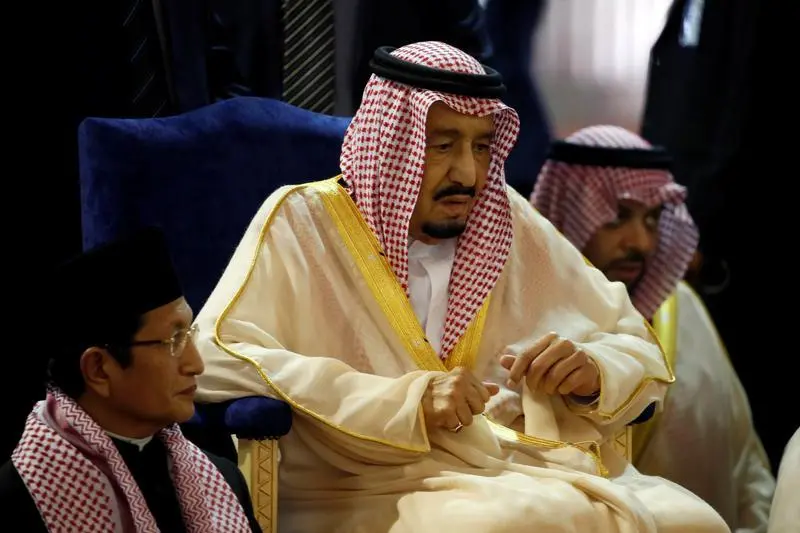PHOTO
By Katie Paul and Andrew Torchia
RIYADH/DUBAI, March 22 (Reuters) - A tour of Asia by Saudi Arabia's King Salman this month has advanced the kingdom's drive to attract foreign investment and diversify its economy beyond oil exports, but the strategy comes with an expensive price tag.
In China, the Saudi king oversaw the signing of deals worth as much as $65 billion in industries including light manufacturing and electronics, as both sides played up a Saudi role in China's One Belt, One Road strategy to integrate Eurasian economies.
A string of deals in Japan included an undertaking by Toyota Motor Corp
That was good news for Riyadh's effort to build a modern, industrial economy which it hopes will create millions of jobs and allow it to cope with an era of cheap oil.
But despite much fanfare, the tour saw few concrete plans for foreign investment in the kingdom's non-oil sectors, even at the non-binding memorandum of understanding (MoU) level.
Most of the big deals were in refining and petrochemicals, not the new industries Riyadh hopes to develop through its Vision 2030 economic reform programme.
And as with investments by its top sovereign wealth fund, the Public Investment Fund (PIF), many proposed projects are located outside Saudi Arabia and would require Riyadh itself to stump up billions of dollars as investment capital.
State oil giant Aramco made a $7 billion investment in a venture with Malaysia's state oil company Petronas, and signed an MoU to look into building refining and petrochemical plants in China.
Such moves cement the kingdom's position as Asia's chief oil supplier, but could also siphon badly needed funds away from domestic investment.
The Saudi government is struggling to rein in a $79 billion budget deficit and is drawing down overseas reserves to resist pressure on the riyal currency's peg to the U.S. dollar.
Steffen Hertog, an economist at the London School of Economics who studies the kingdom, said it made sense for Saudi Arabia to look to Asia for investment and business opportunities given growth in the region's demand for energy and manufacturing.
But he said Riyadh faced harsh competition as it tried to move into new industrial areas, and that it was not entirely clear how the kingdom could fit into Asian economies beyond providing energy and petrochemical feedstock.
"Saudi Arabia currently is running down its overseas reserves at a fairly fast clip. If it ties up significant funds in illiquid investments, this will shorten the shelf-life of its peg to the U.S. dollar, the defense of which requires large-scale liquid foreign assets," said Hertog.
"There is a clear trade-off there that the current investment strategy does not seem to take into account."
TIE-UPS
Saudi Arabia is hoping tie-ups with big Chinese and Japanese conglomerates will give it access to capital, markets and technology. Petrochemical giant Saudi Basic Industries
Riyadh is pursuing a similar tack in the United States, discussing would-be partnerships worth some $200 billion during a simultaneous visit to Washington by King Salman's son.
Among its foreign investments, the PIF has pumped $3.5 billion into U.S. ride-sharing firm Uber and pledged up to $45 billion for a new technology investment fund with Japan's SoftBank.
Joint ventures may not be enough to attract many foreign firms into Saudi Arabia, however. Companies regularly cite red tape, a crude legal system and rising costs as hazards of doing business, and now face new taxes and policies to make hiring foreign workers more expensive.
Inward investment has dropped in recent years. Foreign direct investment in Saudi Arabia peaked above 15 percent of non-oil gross domestic product in 2008 but sank to about 3 percent in 2015, according to the International Monetary Fund.
Jizan Economic City, which was supposed to be filled with Chinese heavy industry, had to be rescued by Aramco after plans for ventures with foreign companies were scrapped in 2013.
A proposed Jaguar Land Rover factory, which was to sit next to the world's biggest aluminium smelter at Ras al-Khair, never materialised.
If Riyadh offers foreign investors quid pro quos to attract their investment, net financial inflows into Saudi Arabia may be small, said James Reeve, deputy chief economist at Saudi Arabia's Samba Financial Group in London
But he argued the strategy made sense because a key goal was to attract not just money but technology needed to upgrade the economy. "If they have to 'pay' to get it, so to speak, then so be it."
(Editing by Hugh Lawson) ((andrew.torchia@thomsonreuters.com; +9715 6681 7277; Reuters Messaging: andrew.torchia.thomsonreuters.com@reuters.net))





















